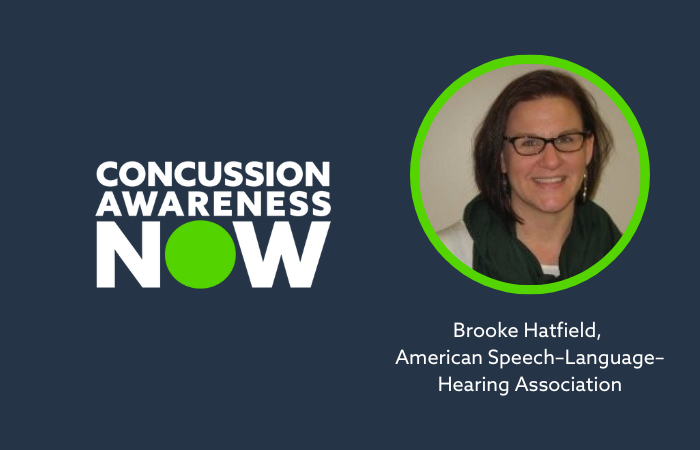Let’s do an experiment: stop for a moment and mentally plan your day tomorrow. Think about what you need to do, what you want to do, and in what order you might do these things.
How did it go? Maybe you made a quick grocery list for recipe ingredients, or maybe you wondered if you’d have time to take a walk if the weather was good. Maybe you remembered that you needed to send the kids to school with a signed permission slip or wanted to mail a birthday card for your aunt to arrive next week. Whatever plan you came up with, you used a lot of different thinking and communication skills to put it into place.
You might be familiar with the physical symptoms of concussion, like headaches, dizziness, and changes in sleep. Any blow to the head or jolt to the body that causes a concussion can also lead to changes in cognitive skills, like thinking and communicating. These symptoms can be just as disruptive as physical problems to getting back into the things that you need, want, and love to do. One type of health care professional who can help you manage these symptoms is a speech-language pathologist.
Changes in Thinking and Communicating After Concussion
Messages travel through the brain and then out to our body through fast, well-coordinated networks. When those networks change from a concussion, it can feel like the whole system has slowed down or has some gaps in it. It’s a little like a complex superhighway that can have traffic jams and detours.
After a concussion, some people notice changes in thinking and communication skills we use all day, every day, like:
- sustained attention, or struggling to get focused or feeling easily distracted;
- divided attention, or splitting your focus between two things like driving and listening to the radio;
- working memory, or holding several things in your mind at one time like digits of a phone number someone just gave you;
- short-term memory, or trouble recalling recent events or information;
- problem solving, or thinking through complex tasks and making decisions;
- word finding, or coming up with the right word at the right moment; and
- comprehension problems, or trouble understanding conversations or familiar reading material.
Each of these thinking and communication skills can impact the others. For example, if you’re having trouble paying attention to more than one thing at a time, following a conversation in a noisy restaurant might be harder. If you’re having trouble holding multiple things in your working memory, it might be frustrating to try to make a decision like picking out a new jacket or planning which order to run errands.
Each of these thinking and communication skills can also be impacted by physical changes related to concussion, like headaches, light sensitivity, and changes in sleep. For example, if it’s hard for you to stay focused, it might be even harder to hold your attention on a lit computer screen. If you aren’t sleeping well, it may feel harder to think of the exact words you want, especially for words you don’t use as often as others like people’s names or complex vocabulary.
After a concussion, people who have changes in thinking and communication often report their brain feels tired or sluggish. They may feel exhausted by having a conversation with someone or reading a news article, even if they’ve been sitting perfectly still. They may feel like it takes them longer to write an email or pick out their clothes in the morning. Mental fatigue and slowed processing speed are real changes that people experience, and without help, people can fall into a vicious cycle of feeling mentally tired but not taking breaks because everything takes longer to do.
Speech-Language Pathologists Can Help
Speech-language pathologists, or SLPs, are licensed allied health professionals who specialize in helping people improve their thinking and communication skills. This may be a surprise to people who have either never heard of the profession or are more familiar with how SLPs work with children to develop speech and language skills. Early expert evaluation and services with an SLP can help people recovering from a concussion understand, manage, and improve changes in thinking and communication so that they can either return to or feel more successful in their daily activities, including school, work, and play.
When someone with a concussion goes to see an SLP, the clinician will conduct a thorough evaluation to learn more about what’s working well and what are some specific areas of difficulty. This is usually done through a thorough history, standardized tests, and a discussion about what they’re experiencing. The SLP will use this information to develop a plan tailored to the individual’s needs, preferences, and goals. Therapy activities are evidence-based and are often focused on both improving the underlying skill and finding ways to modify your activities to avoid running out of mental energy. SLPs also provide valuable education about navigating these changes to the person experiencing the symptoms and the people who support them, like loved ones, teachers, employers, and their medical team.
May is Better Hearing and Speech Month
Each May, the American Speech-Language-Hearing Association highlights the value of SLPs in providing life-altering treatment. You do not have to navigate changes in thinking and communication after a concussion alone.
If you have these concerns, ask your health care provider for a referral to see an SLP. To find an SLP near you, check with your doctor for suggestions for providers in your area, check with your insurance for in-network providers, or you can use ASHA’s ProFind directory. Better thinking and communication is an achievable goal as part of concussion recovery, and SLPs can help.
Brooke Hatfield, MS, CCC-SLP, (she/her/hers) is an ASHA associate director of health care services in speech-language pathology and has expertise in rehabilitation for adults with brain injuries. ASHA is a member of the Concussion Awareness Now coalition.
